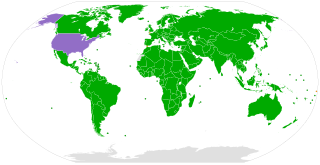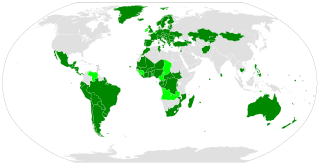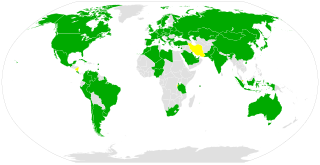The United Nations Convention on Transparency in Treaty-based Investor-State Arbitration (also known as the Mauritius Convention on Transparency) is a multilateral treaty that was concluded in 2014 and entered into force in 2017. As of September 2018, it has been ratified by five states: Cameroon, Canada, Gambia, Mauritius, and Switzerland.
The treaty was adopted on 10 December 2014 by United Nations General Assembly resolution 69/116 during the sixty-ninth session of the General Assembly. It has been signed by 22 states. It entered into force on 18 October 2017 after it had been ratified by its third state.

The United Nations Convention on the Rights of the Child is an international human rights treaty which sets out the civil, political, economic, social, health and cultural rights of children. The convention defines a child as any human being under the age of eighteen, unless the age of majority is attained earlier under national legislation.
Arms control is a term for international restrictions upon the development, production, stockpiling, proliferation and usage of small arms, conventional weapons, and weapons of mass destruction. Arms control is typically exercised through the use of diplomacy which seeks to impose such limitations upon consenting participants through international treaties and agreements, although it may also comprise efforts by a nation or group of nations to enforce limitations upon a non-consenting country.

The Rome Statute of the International Criminal Court is the treaty that established the International Criminal Court (ICC). It was adopted at a diplomatic conference in Rome, Italy on 17 July 1998 and it entered into force on 1 July 2002. As of November 2019, 123 states are party to the statute. Among other things, it establishes court function, jurisdiction and structure.

The International Covenant on Civil and Political Rights (ICCPR) is a multilateral treaty that commits nations to respect the civil and political rights of individuals, including the right to life, freedom of religion, freedom of speech, freedom of assembly, electoral rights and rights to due process and a fair trial. It was adopted by United Nations General Assembly Resolution 2200A (XXI) on 16 December 1966 and entered into force on 23 March 1976 after its thirty-fifth ratification or accession. As of June 2022, the Covenant has 173 parties and six more signatories without ratification, most notably the People's Republic of China and Cuba; North Korea is the only state that has tried to withdraw.
The Convention on the Prevention and Punishment of the Crime of Genocide (CPPCG), or the Genocide Convention, is an international treaty that criminalizes genocide and obligates state parties to pursue the enforcement of its prohibition. It was the first legal instrument to codify genocide as a crime, and the first human rights treaty unanimously adopted by the United Nations General Assembly, on 9 December 1948, during the third session of the United Nations General Assembly. The Convention entered into force on 12 January 1951 and has 152 state parties as of 2022.

The Outer Space Treaty, formally the Treaty on Principles Governing the Activities of States in the Exploration and Use of Outer Space, including the Moon and Other Celestial Bodies, is a multilateral treaty that forms the basis of international space law. Negotiated and drafted under the auspices of the United Nations, it was opened for signature in the United States, the United Kingdom, and the Soviet Union on 27 January 1967, entering into force on 10 October 1967. As of March 2023, 113 countries are parties to the treaty—including all major spacefaring nations—and another 23 are signatories.

The Vienna Convention on the Law of Treaties (VCLT) is an international agreement that regulates treaties among sovereign states; the VCLT is a codification of customary international law and state practice concerning treaties.
Ratification is a principal's approval of an act of its agent that lacked the authority to bind the principal legally. Ratification defines the international act in which a state indicates its consent to be bound to a treaty if the parties intended to show their consent by such an act. In the case of bilateral treaties, ratification is usually accomplished by exchanging the requisite instruments, and in the case of multilateral treaties, the usual procedure is for the depositary to collect the ratifications of all states, keeping all parties informed of the situation.

The Convention on the Elimination of all Forms of Discrimination Against Women (CEDAW) is an international treaty adopted in 1979 by the United Nations General Assembly. Described as an international bill of rights for women, it was instituted on 3 September 1981 and has been ratified by 189 states. Over fifty countries that have ratified the Convention have done so subject to certain declarations, reservations, and objections, including 38 countries who rejected the enforcement article 29, which addresses means of settlement for disputes concerning the interpretation or application of the convention. Australia's declaration noted the limitations on central government power resulting from its federal constitutional system. The United States and Palau have signed, but not ratified the treaty. The Holy See, Iran, Somalia, Sudan, and Tonga are not signatories to CEDAW.

The African Nuclear-Weapon-Free Zone Treaty, also known as the Treaty of Pelindaba, establishes a Nuclear-Weapon-Free Zone in Africa. The treaty was signed in 1996 and came into effect with the 28th ratification on 15 July 2009.

The states parties to the Rome Statute of the International Criminal Court are those sovereign states that have ratified, or have otherwise become party to, the Rome Statute of the International Criminal Court. The Rome Statute is the treaty that established the International Criminal Court, an international court that has jurisdiction over certain international crimes, including genocide, crimes against humanity, and war crimes that are committed by nationals of states parties or within the territory of states parties. States parties are legally obligated to co-operate with the Court when it requires, such as in arresting and transferring indicted persons or providing access to evidence and witnesses. States parties are entitled to participate and vote in proceedings of the Assembly of States Parties, which is the Court's governing body. Such proceedings include the election of such officials as judges and the Prosecutor, the approval of the Court's budget, and the adoption of amendments to the Rome Statute.

The Optional Protocol to the Convention Against Torture and Other Cruel, Inhuman or Degrading Treatment or Punishment is a treaty that supplements to the 1984 United Nations Convention Against Torture. It establishes an international inspection system for places of detention modeled on the system that has existed in Europe since 1987.

The International Campaign to Abolish Nuclear Weapons is a global civil society coalition working to promote adherence to and full implementation of the Treaty on the Prohibition of Nuclear Weapons. The campaign helped bring about this treaty. ICAN was launched in 2007. In 2022, it counted 661 partner organizations in 110 countries.

The Convention on Registration of Objects Launched into Outer Space was adopted by the United Nations General Assembly in 1974 and went into force in 1976. As of February 2022, it has been ratified by 72 states.

The Arms Trade Treaty (ATT) is a multilateral treaty that regulates the international trade in conventional weapons.
The Terrorist Financing Convention is a 1999 United Nations treaty designed to criminalize acts of financing acts of terrorism. The convention also seeks to promote police and judicial co-operation to prevent, investigate and punish the financing of such acts. As of October 2018, the treaty has been ratified by 188 states; in terms of universality, it is therefore one of the most successful anti-terrorism treaties in history.
The Hostages Convention is a United Nations treaty by which states agree to prohibit and punish hostage taking. The treaty includes definitions of "hostage" and "hostage taking" and sets out the principle of aut dedere aut judicare: a party to the treaty must prosecute a hostage taker if no other state requests extradition for prosecution of the same crime.

Corruption in Lithuania describes the prevention and occurrence of corruption in Lithuania.

The Optional Protocol to the Convention on the Rights of the Child on a Communications Procedure is a treaty open to states that are party to the Convention on the Rights of the Child. The Protocol was adopted by the United Nations' General Assembly on 19 December 2011 and entered into force on 14 April 2014, following ratification by 10 states.